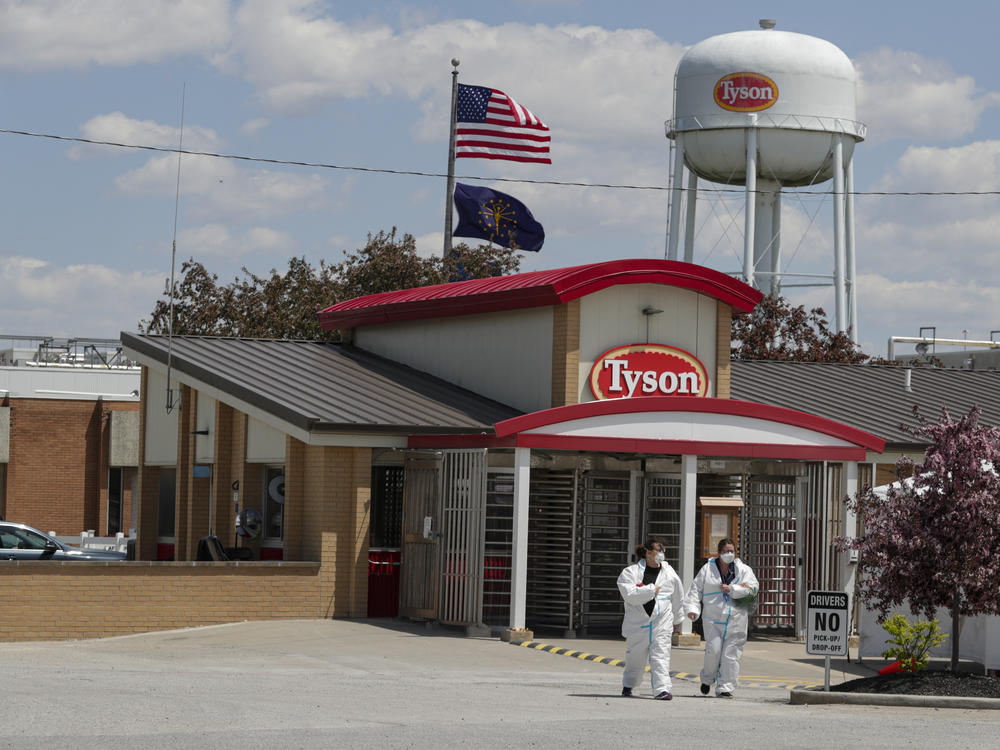Section Branding
Header Content
Meatpacking Companies, OSHA Face Investigation Over Coronavirus In Plants
Primary Content
A U.S. House subcommittee is investigating coronavirus outbreaks at meatpacking plants, citing the deaths of more than 250 employees nationwide and accusing the Trump administration of failing to enforce worker safety laws.
Rep. James Clyburn, D-S.C., chairman of the Select Subcommittee on the Coronavirus Crisis, announced the probe in a press release on Monday. He said he sent letters requesting documents from the Occupational Safety and Health Administration, part of the Department of Labor, as well as three of the country's largest meatpacking companies: Tyson Foods, Smithfield Foods and JBS USA.
"Public reports indicate that under the Trump Administration, the Occupational Safety and Health Administration (OSHA) failed to adequately carry out its responsibility for enforcing worker safety laws at meatpacking plants across the country, resulting in preventable infections and deaths," Chairman Clyburn wrote to the agency. "It is imperative that the previous Administration's shortcomings are swiftly identified and rectified to save lives in the months before coronavirus vaccinations are available for all Americans."
Clyburn said that despite thousands of confirmed infections at meatpacking plants across the country, OSHA under the Trump administration issued only eight citations and less than $80,000 in penalties for coronavirus-related violations.
Nearly 54,000 workers at 569 plants have tested positive for COVID-19, and at least 270 have died, according to the Food and Environment Reporting Network. Many meatpacking employees are Black, Hispanic and/or from low-income households, the release notes, meaning they come from vulnerable communities that have been hit disproportionately hard by the pandemic.
"Public reports indicate that meatpacking companies ... have refused to take basic precautions to protect their workers, many of whom earn extremely low wages and lack adequate paid leave, and have shown a callous disregard for workers' health," Clyburn wrote, adding that outbreaks at meatpacking plants also take a toll on the surrounding community.
In a statement to NPR, a Labor Department spokesperson noted that the investigation is "focused on the Trump administration's actions" and said that the department is "committed to working with the Committee."
The three companies at the center of the investigation have had a combined total of 41 "major outbreaks" in facilities across 20 states, including some facilities with multiple outbreaks, according to Clyburn.
In separate statements, JBS and Smithfield Foods said they looked forward to providing the subcommittee with information about their pandemic response and workplace safeguards. Tyson Foods did not respond to NPR's request for comment in time for publication.
"From early in the pandemic, we have taken extraordinary measures to protect our team members from the virus and we have met or exceeded the prevailing federal, state and local health and safety guidance, including with personal protective equipment," said Keira Lombardo, chief administrative officer of Smithfield Foods, adding there have been "inaccuracies and misinformation in the media on this issue."
Lombardo said the company has invested more than $700 million in employee protection measures such as physical barriers, signage, sanitation stations and COVID-19 pre-screening, as well as leave programs and other protocols to keep sick employees offsite.
JBS USA spokesperson Nikki Richardson said the company has invested more than $200 million in health and safety interventions and $160 million in bonuses and pay increases, in addition to implementing safety measures such as offering unlimited personal protective equipment, testing symptomatic workers and close contacts, covering COVID-19 related health expenses for employees and removing "vulnerable population groups with full pay and benefits."
As for OSHA, Clyburn alleges that the agency did not issue enforceable rules, respond quickly enough to complaints or impose adequate fines on companies whose unsafe practices led to employee deaths.
He cited the case of a Smithfield Foods plant in Sioux Falls, S.D., where 1,294 workers got sick and four died. OSHA fined the company $13,494, which comes out to less than $11 per infected employee, Clyburn said, before drawing a contrast to its chief executive officer's salary of $14 million.
In his letter to OSHA, Clyburn outlined several other cases in which he said the agency failed to hold meatpacking companies accountable for safety violations. When a JBS plant in Colorado was home to 290 confirmed cases and six employee deaths, for example, OSHA cited the company with just two violations and a total fine of $15,615.
"A fine this small imposed on JBS, the world's largest meatpacker with $51.7 billion in annual revenue, is effectively meaningless," Clyburn wrote.
This subcommittee is not the first governmental body to raise concerns about OSHA's handling of pandemic workplace safety at meatpacking plants. Clyburn's letter to the agency cited the Government Accountability Office's findings, published Jan. 28, of "gaps in OSHA's oversight and tracking of its adapted enforcement methods" during the pandemic.
Former OSHA official Deborah Berkowitz, who served during the Obama administration, told NPR's Morning Edition last month that the agency under the Trump administration failed to protect workers at meatpacking plants and other workplaces, noting its lack of standardized, nationwide requirements for businesses.
Berkowitz said by her count, OSHA should have done 10,000 to 20,000 safety inspections since March, but that the number was closer to just a few hundred.
OSHA Principal Deputy Assistant Secretary Loren Sweatt told NPR that the agency has "issued nearly 300 COVID citations and kept hundreds of thousands of workers safe on the job."
OSHA released new guidance at the end of January aimed at protecting employees from COVID-19.
The subcommittee is requesting documents from OSHA and the three companies about coronavirus-related illnesses and deaths, as well as enforcement of worker protections under the Trump administration. They are asking the companies to turn over their documents, and for OSHA to provide a staff briefing, by no later than Feb. 15.
Copyright 2021 NPR. To see more, visit https://www.npr.org.

